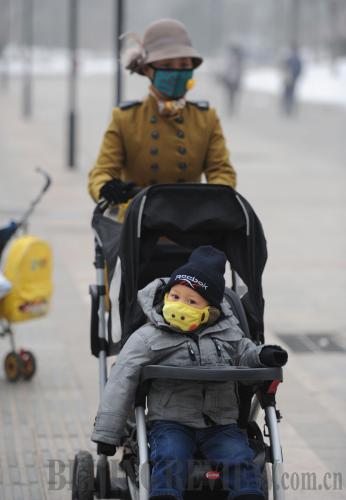|
 |
|
FEAR OF AIR: Local citizens stroll the streets of Beijing in masks on January 23 (XINHUA) |
I suffer from "the cough," a raspy high-pitched chronic wheeze which is a natural reaction of the body against the presence of foreign particles in airways.
Speaking of natural reactions to foreign matters, He Quanying, Director of the Respiratory Care Department of Peking University People's Hospital, takes exception to juxtaposing the condition with the name of the city of Beijing. Such a term originated within the Beijing expat community, according to South China Morning Post, and has become virally contagious among Chinese netizens.
"Before you can find clear evidence of a [causal link], using the term 'Beijing cough' is an extreme insult to Beijing," He told Economic Information Daily.
Zhu Dake, a professor of literary criticism at Tongji University insinuated that although haze might not clog respiratory passages, it might affect the brain. "Are the words insulting to Beijing, or the smog and sources of the smog?" Zhu mused in his microblog.
But health experts are quite right to point out the so-called "Beijing cough" is not the official name of any disease. A cough is merely a symptom which could be associated with many different causes, according to Pan Xiaochuan, a professor at the Peking University School of Public Health, who notes that the time of the year expats most frequently complain of itchy throat coincides with flu season.
China's capital deserves better treatment than this. The name of whatever malady to which its delicate expats seem so susceptible ought to be named "beige lung." Many urban areas appear to be a mild off-white or brown color in satellite imagery.
Before I am accused of escalating acrimony over Beijing's special atmospheric conditions and inviting a human flesh search from angry netizens, I confess I recently engaged in a friendly argument with a Beijinger who contrarily felt the city's air quality has plummeted in the past five years.
Not so, I contended: Notwithstanding the anomalous smog of January 11-13 when hospitals reported a surge of respiratory complications, Beijing's air only seems dramatically worse because the municipal government recently enhanced the precision of its environmental monitoring standards to include data measuring airborne particulate matter in the 2.5-micrometer range (PM2.5).
Enhanced environmental monitoring is unequivocally a good thing. It is a sign of progress for China's first tier cities, even putting some municipalities of developed countries to shame.
Yet thanks to local health authorities, I realized my error. My local friend had been away from Beijing for four years to attend university in Guangzhou, south China's Guangdong Province. Perhaps I had to borrow a technical term from Professor Pan—"acclimatized" to Beijing air and become inured to its deleterious effects on my own health, while my friend who had returned more recently was in a comparatively advantageous position to observe changes in air quality.
The slightest implication that any segment of the population can or should be able to "acclimatize" or adapt to conditions which health experts overwhelmingly agree are hazardous to health is a far more grave insult to Beijing's very young and very old. These segments of the population are without a doubt far more vulnerable than mainly young-adult to middle-aged expats.
It ought to be beneath the dignity of health experts to respond to the wisecracks and catchphrases of the city's foreign population. Doing so legitimizes implied criticisms and threatens to internationalize what rightfully should be considered a domestic issue.
Around the time of my initial arrival to Beijing in 2008, U.S. cyclists apologized for insulting their Olympic hosts after being photographed wearing respiratory masks upon arrival at Beijing Capital Airport.
Now, similar respiratory masks are a common sight in the capital, and China's first tier cities provide hourly PM2.5 data, alerting citizens to the presence of airborne particles small enough to penetrate lung tissue and enter the bloodstream.
It is not as if an occult hand is manipulating events to make Beijingers blush behind masks and increasingly sensitive statistics, although global warming deniers and other factions within the United States are undeniably desperate to downplay their own country's grossly disproportionate contribution to the destruction of planetary atmosphere.
The only meaningful dialogue on Beijing's airborne pollution—caused by everything from geographic proximity to a semiarid desert to coal-burning stoves to construction dust and vehicle exhaust—is taking place exclusively within the Chinese population. China's health authorities should concern themselves with treating injuries to people rather than commenting on a mild insult.
The author is an American living in Beijing
Expats, we need your stories!
If you're an expatriate living or once lived in China and have a story to tell or an opinion to share about any aspect of life here, we are interested in hearing about it. We offer payment for published stories (700-900 words). Submissions may be edited.
Email us at: zanjifang@bjreview.com
Please provide your name, nationality and address along with your stories | 